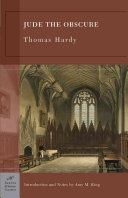
Jude the Obscure
By - Hardy, Thomas , King M.Amy
Floor
-
Floor 3
Published
-
Oxford University Press, Oxford, 2003
ISBN 10 - 1593080352
ISBN 13 - 9781593080358
Book Status
-
1 Qnty Available with us.
Subject
-
England--Wessex
Shelf No
-
8
Call Number
-
823.8 HAR
Physical Description
-
440 pages